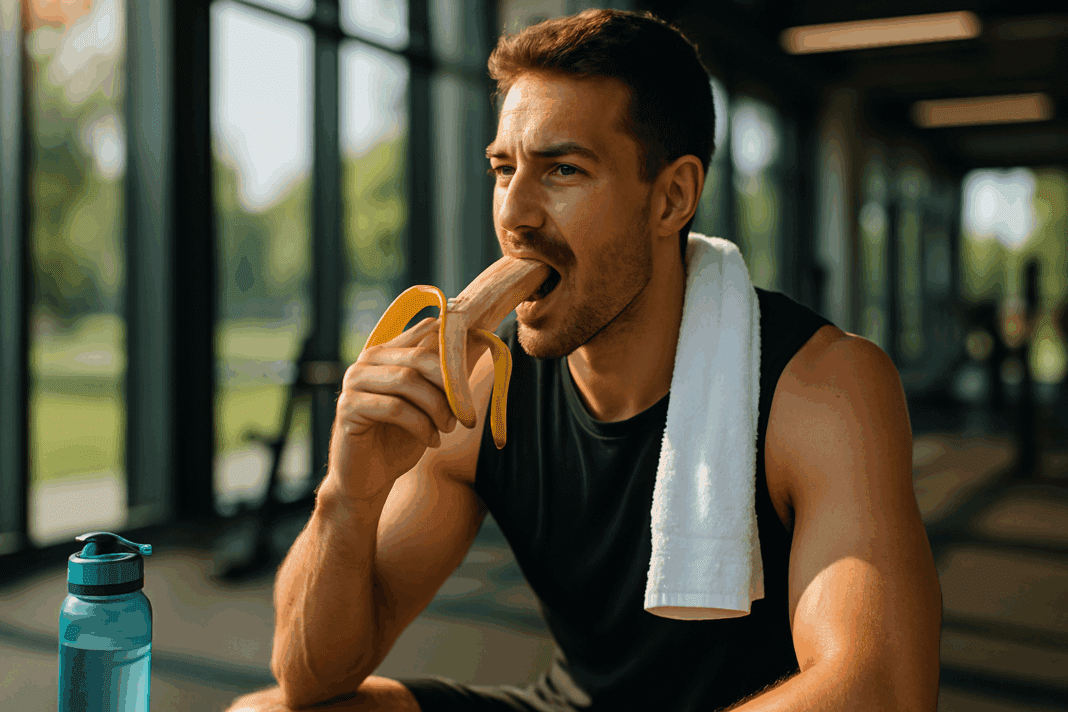Rethinking Recovery Nutrition Through a Scientific Lens
In the evolving landscape of strength training and athletic recovery, the focus on nutrition has expanded beyond protein shakes and branched-chain amino acids. Today, a more holistic approach to post-workout nutrition recognizes the value of whole foods in optimizing muscular repair, hormonal balance, and glycogen replenishment. Among the many foods praised for their recovery-enhancing properties, bananas have emerged as a subject of curious attention. One of the most commonly asked questions in fitness forums and clinical settings alike is: are bananas good for post workout recovery? The simple nature of the fruit belies its complex role in replenishing depleted energy stores, managing inflammation, and contributing to muscle health.
Understanding the answer to this question requires unpacking the biochemical processes triggered during and after exercise, including the breakdown of muscle fibers, loss of electrolytes, and shifts in blood glucose levels. This article will explore those mechanisms in depth while analyzing the unique nutrient profile of bananas. From their role in reducing muscle soreness to their surprising benefits for strength and hormone regulation, we will assess the evidence behind whether this humble fruit deserves a place in your post-training ritual.
You may also like: 10 Powerful Active Rest Day Ideas to Boost Recovery and Build Lasting Strength
Are Bananas Good for Post Workout Recovery? A Biochemical Perspective
When assessing whether bananas are good for post workout purposes, it is essential to consider the metabolic state of the body immediately after exercise. Intense resistance training depletes glycogen, generates oxidative stress, and causes microtrauma to muscle fibers. The body’s response is to initiate an anabolic window—typically lasting 30 to 60 minutes—during which nutrient uptake is optimized to repair and rebuild tissue. Bananas, with their naturally high carbohydrate content and rich array of micronutrients, align closely with the demands of this window.
Bananas contain approximately 27 grams of carbohydrates per medium fruit, primarily as glucose and fructose. These sugars rapidly replenish glycogen, particularly in muscle cells primed for recovery. More importantly, bananas provide a robust dose of potassium—around 400 to 450 milligrams—which plays a crucial role in muscle contraction and the prevention of cramps. Low potassium levels have been associated with increased post-exercise soreness and impaired neuromuscular communication. Thus, eating banana after exercise may help mitigate common symptoms such as cramping and muscular fatigue.
In addition to potassium, bananas offer magnesium, vitamin C, and small amounts of vitamin B6—all of which are involved in energy metabolism and neuromuscular function. These compounds collectively aid in stabilizing blood sugar, enhancing mitochondrial recovery, and modulating inflammation, making bananas a scientifically credible option for those seeking a natural and effective post-workout recovery food.
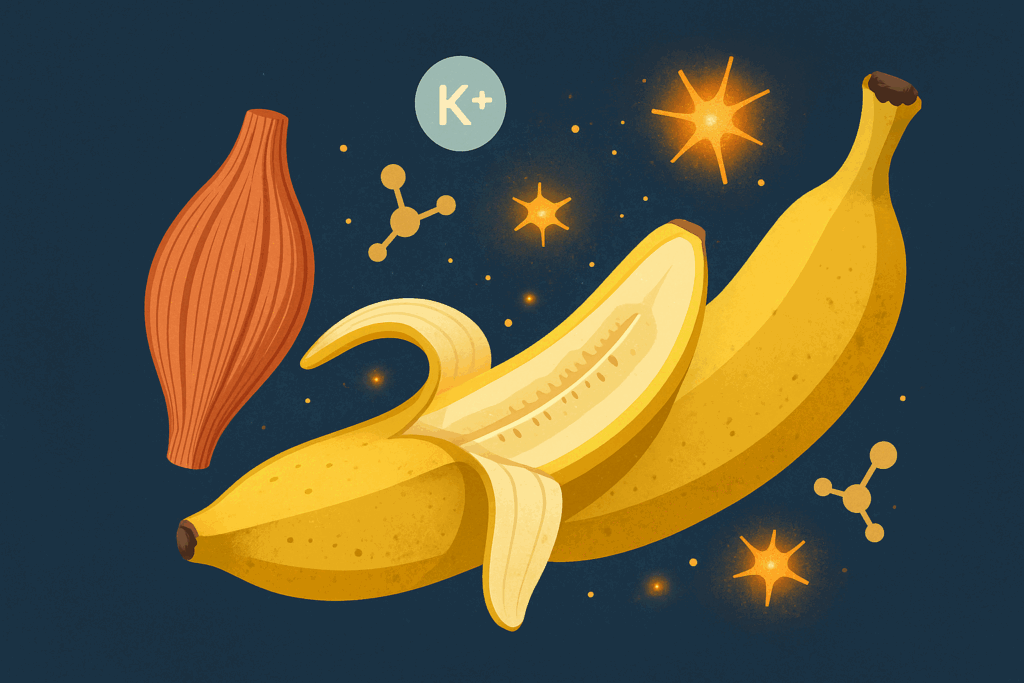
The Glycemic Advantage of Eating Banana After Exercise
The timing and type of carbohydrate intake are pivotal for maximizing post-exercise recovery. One of the lesser-known benefits of eating banana after exercise is its medium glycemic index (GI), which facilitates a balanced and sustained insulin response. Insulin is an anabolic hormone, meaning it promotes the uptake of amino acids and glucose into cells—both of which are necessary for muscle repair and energy restoration.
While high-GI foods like white bread and sugary sports drinks can provoke a rapid insulin spike, they also tend to cause a swift drop in blood glucose, potentially leading to fatigue or irritability. Bananas, with their moderate GI of 51–60 depending on ripeness, provide a more sustained glucose delivery to muscle tissue. This results in effective glycogen repletion without triggering the insulin rollercoaster often observed with synthetic carbohydrate sources.
Additionally, bananas contain resistant starch, particularly when less ripe. Resistant starch behaves like dietary fiber in the digestive system, slowing absorption and promoting gut health. For athletes who experience digestive discomfort post-training, this can be especially valuable. The presence of such starches may explain why bananas are often well-tolerated even during endurance activities, providing fuel while minimizing gastrointestinal distress.
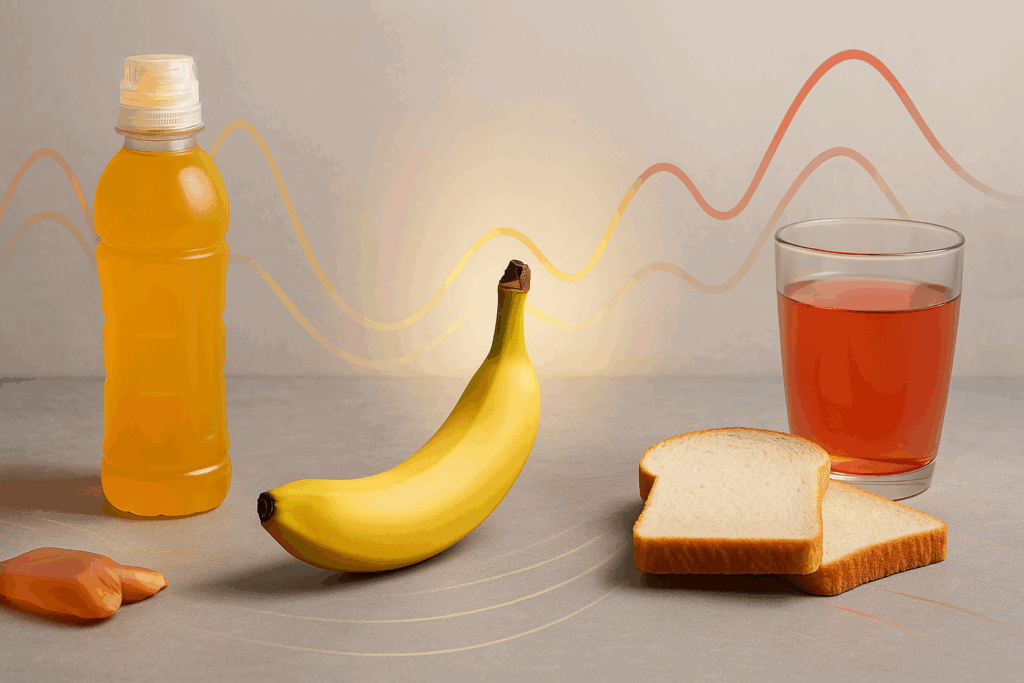
Do Bananas Help Sore Muscles and Support Recovery?
Among athletes and gym-goers alike, delayed onset muscle soreness (DOMS) is a common and often frustrating phenomenon. The search for effective nutritional interventions to manage soreness has led researchers to investigate foods with anti-inflammatory and antioxidant properties. This brings us to the question: do bananas help sore muscles? While bananas are not a panacea, they offer several components that may assist in reducing muscle soreness and speeding recovery.
The vitamin C content in bananas, although modest, contributes to collagen synthesis and immune modulation. Collagen is vital for repairing connective tissue, which often incurs micro-damage during resistance training. Bananas also contain dopamine and catecholamines—biogenic amines that exhibit mild anti-inflammatory effects and may influence mood and motivation during recovery. These neurotransmitter-like compounds are often overlooked in nutritional analyses, yet they add another layer to banana’s recovery potential.
Moreover, bananas are hydrating in nature, composed of nearly 75% water. Proper hydration is critical for the transport of nutrients and waste products during the recovery process. When combined with their electrolyte content, this makes bananas a solid choice for replenishing lost fluids and promoting systemic balance. Although they cannot replace advanced supplements or clinical interventions, bananas do offer a low-cost, accessible way to support muscle recovery and reduce soreness.
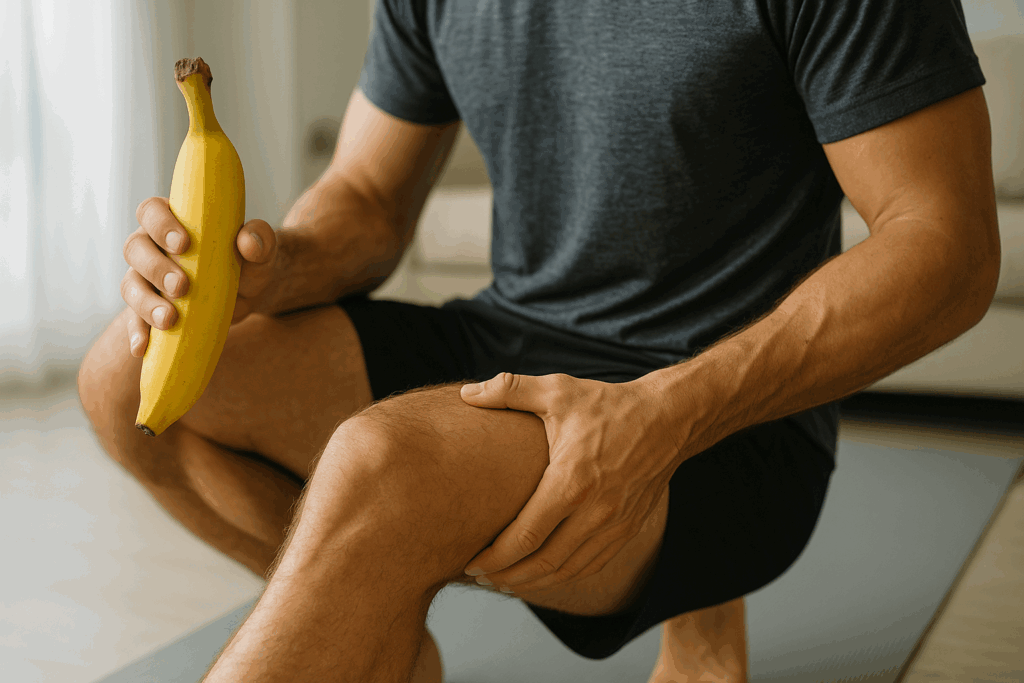
Are Bananas Good for Building Muscle Mass?
While protein often takes center stage in muscle-building conversations, carbohydrates are equally vital for hypertrophy. This raises a related query: are bananas good for building muscle? The answer lies in their ability to enhance anabolic signaling, fuel intense training sessions, and prevent catabolism.
Bananas help restore muscle glycogen, which serves as the primary energy source for resistance training. Without adequate glycogen, workouts become shorter, less intense, and ultimately less productive. The carbohydrates in bananas ensure that your muscles are adequately fueled, enabling better performance and longer time under tension—two critical variables for hypertrophy.
Furthermore, insulin spikes initiated by carbohydrate intake can facilitate the uptake of amino acids when consumed alongside protein. A banana paired with whey protein or Greek yogurt creates an ideal anabolic snack that promotes muscle protein synthesis (MPS). While bananas do not contain significant protein themselves, their synergy with protein-rich foods makes them valuable in a muscle-building diet.
Bananas also provide manganese, a trace mineral essential for protein metabolism and connective tissue formation. This adds a layer of indirect support to muscle development that extends beyond simple carbohydrate provision. When integrated intelligently, bananas complement a well-rounded, strength-focused nutrition plan.
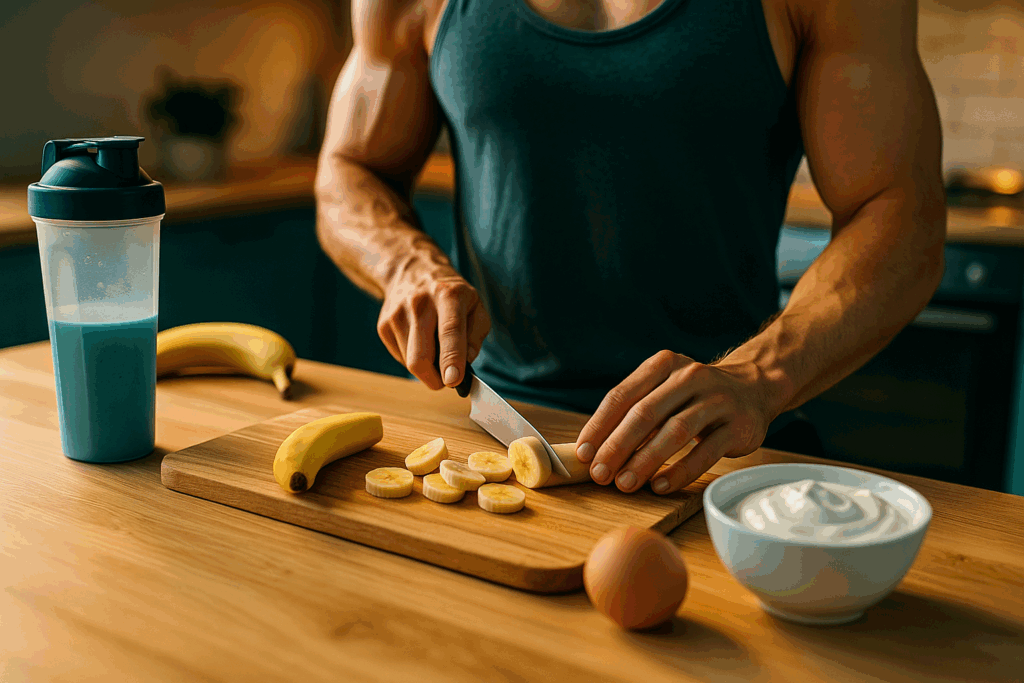
Do Bananas Help Muscle Soreness More Than Other Fruits?
Many fruits boast antioxidant and anti-inflammatory properties, but few are as convenient and multi-functional as bananas. When examining the question, do bananas help muscle soreness more effectively than other fruits, it’s important to consider comparative nutrient density and bioavailability.
Bananas are often contrasted with cherries, oranges, and berries in this regard. While cherries contain anthocyanins with potent anti-inflammatory activity, and berries provide polyphenols that scavenge free radicals, bananas excel in a few unique areas. Their high potassium content is unmatched among commonly consumed fruits. Additionally, their carbohydrate profile makes them especially well-suited for replenishing post-workout energy reserves.
The combination of fast-absorbing sugars, mood-enhancing biogenic amines, and hydration capacity gives bananas a multidimensional edge. They are portable, require no refrigeration, and digest easily, making them more practical for immediate post-exercise consumption. Although no single fruit can comprehensively address all facets of muscle soreness, bananas provide a highly effective, easy-to-implement strategy for those seeking both convenience and functionality in recovery nutrition.
Practical Strategies for Including Banana After Exercise
Incorporating bananas into your post-workout nutrition doesn’t have to be repetitive or monotonous. The versatility of this fruit makes it an excellent base or complement to a wide variety of recovery-friendly meals. Eating banana after exercise can be as simple as grabbing a fresh fruit or as elaborate as blending it into a protein-packed smoothie with nut butter and oats.
For those focused on maximizing glycogen replenishment and MPS, pairing bananas with fast-digesting proteins is ideal. A post-workout bowl of Greek yogurt topped with banana slices and honey delivers a balanced mix of protein, simple carbohydrates, and electrolytes. Similarly, a smoothie featuring bananas, spinach, whey protein, and flaxseeds provides a spectrum of nutrients conducive to muscular repair and inflammation management.
Another practical application is using bananas in baked recovery snacks such as protein muffins or oatmeal bars. These can be prepared in advance and consumed on the go, providing strategic fuel in the critical post-exercise window. Whether consumed solo or combined with other nutrient-dense ingredients, bananas offer a flexible and scientifically grounded option for supporting muscle recovery.
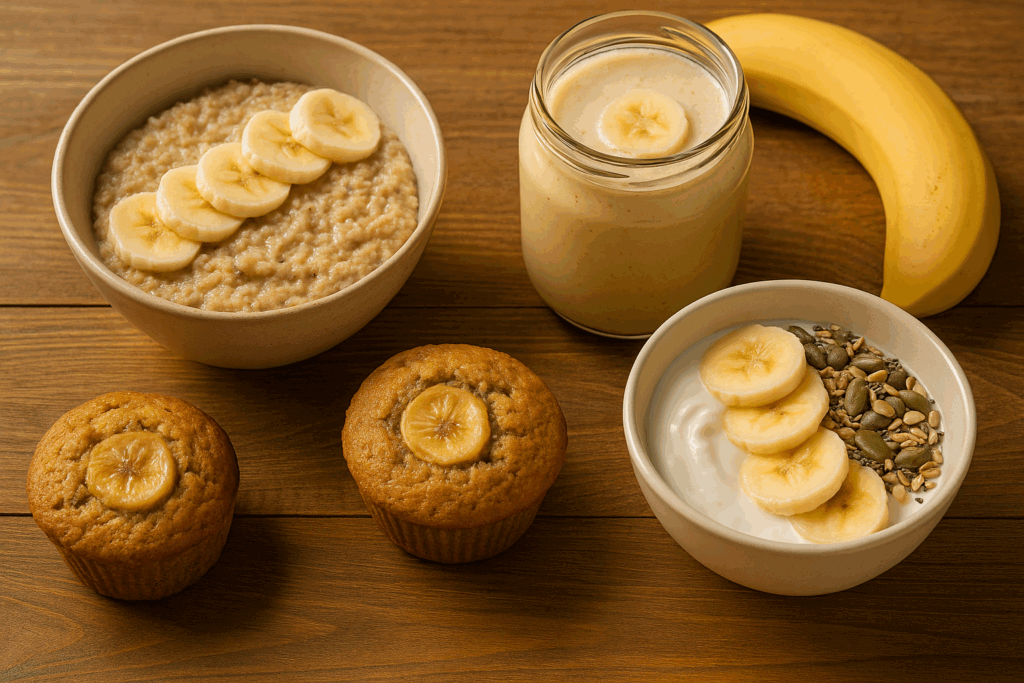
Are Bananas Good for Post Workout Hydration and Electrolyte Balance?
Electrolyte balance is often underestimated in the context of post-workout recovery. Sweating during intense training sessions leads to losses in sodium, potassium, and magnesium, all of which are critical for muscular and cardiovascular function. This raises the question: are bananas good for post workout hydration and electrolyte repletion?
While bananas do not contain sodium—a primary electrolyte lost in sweat—they excel in replenishing potassium and magnesium. This makes them especially valuable in preventing post-exercise cramping, dizziness, and fatigue. When paired with lightly salted water or a sodium-rich snack, bananas can form part of an effective hydration strategy.
In endurance athletes, maintaining electrolyte balance is essential for avoiding hyponatremia and sustaining performance. A banana consumed within 30 minutes of training supports cardiovascular recovery and reduces the likelihood of electrolyte imbalance symptoms. Additionally, the fruit’s natural sugars help facilitate faster cellular uptake of electrolytes and water, enhancing rehydration efficiency.
For individuals who struggle with electrolyte supplements or synthetic rehydration solutions, bananas provide a gentle, natural alternative that is less likely to cause digestive issues. This positions them as an accessible tool for anyone seeking a holistic and effective approach to hydration.
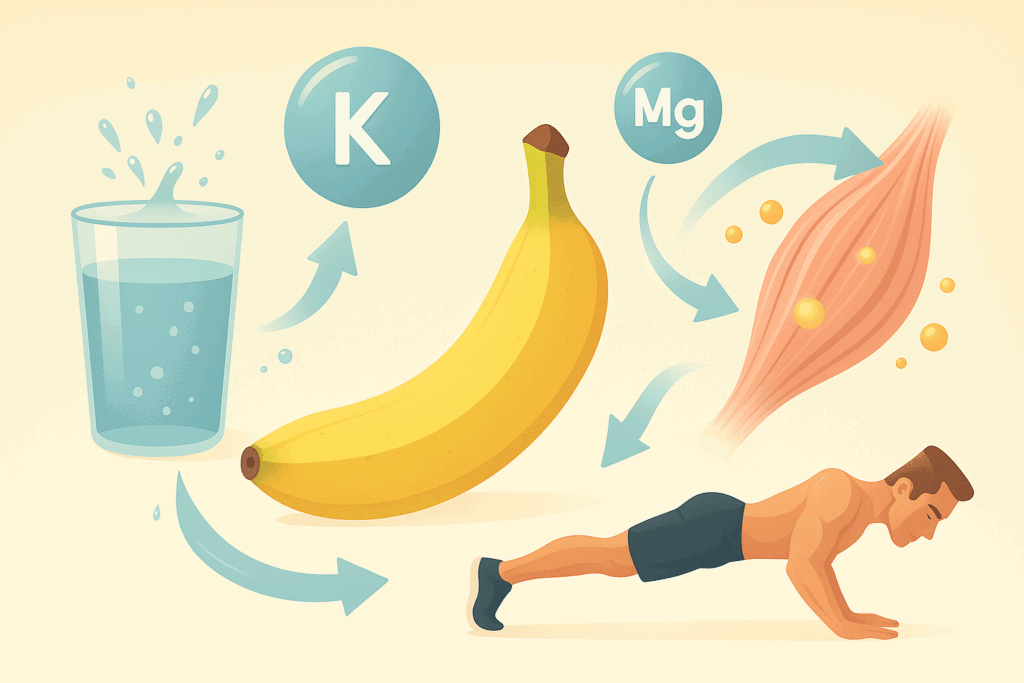
Does Bananas Help with Sore Muscles in Older Adults?
Recovery needs change across the lifespan, with older adults experiencing a greater propensity for inflammation, joint stiffness, and muscle breakdown. In this context, many wonder: does bananas help with sore muscles in aging populations? The answer appears to be a qualified yes, especially when bananas are used in conjunction with resistance training and other recovery modalities.
Bananas offer a gentle source of carbohydrates and electrolytes, both of which are essential for maintaining muscular and neurological health in older adults. Their soft texture and easy digestibility make them ideal for those who may have chewing or digestive limitations. Additionally, the dopamine content of bananas may offer mood benefits, which can be particularly meaningful in post-retirement populations prone to depression and low motivation.
Moreover, muscle soreness and stiffness in older adults are often exacerbated by dehydration and poor mineral intake. Bananas address both concerns by delivering water-rich nutrition and replenishing critical micronutrients like potassium and magnesium. When included as part of a balanced post-exercise routine, bananas can improve functional recovery and overall quality of life.
Finally, for older adults managing blood sugar, bananas can be consumed in moderation and paired with fiber-rich or protein-dense foods to mitigate glycemic response. This allows for continued muscle maintenance and soreness reduction without jeopardizing metabolic control.
The Verdict: Are Bananas Good for Post Workout Recovery?
After analyzing the scientific evidence and practical applications, it becomes clear that bananas earn their place among the most effective whole-food options for recovery nutrition. They support every phase of the post-workout process—from glycogen replenishment and electrolyte balance to inflammation control and muscle repair. For those asking are bananas good for post workout recovery, the data affirm that they are both an accessible and functional choice.
Bananas serve as a valuable tool in muscle recovery strategies due to their carbohydrate content, hydration support, and micronutrient profile. When paired with high-quality protein and hydration protocols, they can accelerate recovery timelines and reduce perceived muscle soreness. Moreover, they integrate seamlessly into a variety of dietary styles, from plant-based to omnivorous, offering flexible solutions for a wide range of athletes.
Though not a substitute for structured supplementation or comprehensive medical interventions, bananas offer a foundational element in recovery nutrition that is too often overlooked. By incorporating bananas consistently and strategically, individuals can enhance their post-workout experience and take meaningful steps toward building resilient, well-nourished muscle tissue.
Frequently Asked Questions: Are Bananas Good for Post Workout Recovery?
1. How exactly are bananas good for post workout recovery compared to protein shakes?
While protein shakes target muscle protein synthesis directly, bananas offer a more holistic nutritional benefit. They help restore glycogen stores rapidly thanks to their high natural sugar content and support electrolyte balance through their potassium and magnesium levels. The fiber and antioxidants in bananas also aid in reducing oxidative stress, something protein shakes often lack. Additionally, bananas are free from artificial additives, which can sometimes cause gastrointestinal issues in sensitive individuals. For those seeking a natural, digestible, and affordable recovery option, bananas can complement or even substitute shakes when paired with a protein-rich food.
2. Do bananas help muscle soreness through hydration or anti-inflammatory compounds?
Bananas offer dual benefits when it comes to soreness: hydration and biochemical modulation. Their high water content and rich supply of potassium help rehydrate the body efficiently after sweat-heavy workouts. They also contain dopamine and other biogenic amines that offer mild anti-inflammatory properties, supporting tissue repair. This neurochemical benefit adds a mental component, subtly improving mood and reducing perceived pain. Combined with their easy digestibility, bananas create a comprehensive post-workout recovery food that targets soreness from multiple physiological angles.
3. Are bananas good for building muscle if you eat them before working out instead?
Yes, bananas are effective pre-workout fuels that can still support muscle-building goals. Their fast-digesting carbohydrates provide a quick energy source to power through resistance training. This spares glycogen in the early stages of exercise, allowing for longer, more intense sessions—crucial for muscle hypertrophy. Bananas also stabilize blood glucose levels, preventing mid-session crashes. While they don’t directly trigger muscle growth, they enhance training output, which is foundational to building lean mass over time.
4. What is the ideal way to consume banana after exercise to maximize recovery?
The best way to consume banana after exercise is to combine it with a source of protein to optimize muscle recovery. For example, blending a banana with whey protein and unsweetened almond milk creates a muscle-repairing and glycogen-restoring shake. Alternatively, topping Greek yogurt with sliced bananas and chia seeds makes a satisfying post-workout bowl. If you prefer solid food, pairing a banana with hard-boiled eggs or a handful of almonds balances protein and fats. Timing matters too; consuming it within 30 to 60 minutes post-exercise leverages the body’s peak absorption window.
5. Why are bananas considered better than sports drinks for electrolyte replenishment?
Bananas contain natural electrolytes like potassium and magnesium without the added sugars, artificial dyes, or preservatives found in many sports drinks. This makes them ideal for those with sensitivities to additives or who are focused on clean eating. While they lack sodium, this can be easily supplemented with salted water or snacks. The slower sugar absorption of bananas helps maintain steady energy levels, whereas sports drinks may spike and crash glucose. Thus, eating banana after exercise is a more sustainable choice for long-term electrolyte management and cellular hydration.
6. Does bananas help with sore muscles after endurance events like marathons?
Yes, bananas can be very effective for endurance recovery. Long-distance events heavily deplete glycogen stores and strain neuromuscular systems. Bananas provide a quick influx of glucose, which rapidly restores energy reserves. Their electrolyte content also combats cramping and neuromuscular fatigue, both common in endurance athletes. Furthermore, bananas are gentle on the stomach—a crucial factor when digestion is compromised post-event. These attributes make bananas a staple in many marathon and triathlon recovery kits.
7. Are bananas good for post workout recovery in hot climates or after sweat-heavy sessions?
Absolutely. In hot environments where sweat loss is pronounced, banana muscle recovery benefits shine. Bananas replenish potassium lost through sweat, helping to prevent dehydration-related symptoms such as fatigue, cramping, or dizziness. Their natural sugar aids in restoring energy while their water content supports hydration. When paired with a salty snack or a rehydration solution, they contribute to a complete replenishment strategy. For those exercising outdoors in heat, bananas offer a reliable, cooling, and replenishing food source.
8. How does eating banana after exercise impact hormone regulation and mental recovery?
Bananas contain precursors to dopamine and serotonin, neurotransmitters that regulate mood, motivation, and recovery perception. After intense training, mental fatigue is common, and bananas offer a natural way to support psychological recovery. The carbohydrate-induced insulin response also promotes the uptake of tryptophan, a serotonin precursor. This effect can help stabilize mood post-exercise and may improve sleep quality when consumed after evening workouts. Thus, bananas serve not only as physical fuel but also as a tool for hormonal and mental rebalancing.
9. Is banana good after workout for people with sensitive digestion?
Yes, bananas are widely regarded as one of the most easily digestible fruits, making them excellent for those with sensitive digestion. They are low in fiber when ripe and contain pectin, which helps bind stools and supports gut health. Unlike high-protein bars or dairy-heavy shakes, bananas rarely cause bloating or gastric discomfort. For individuals recovering from strenuous activity and looking to avoid gastrointestinal upset, bananas offer an ideal post-workout option. They also pair well with gentle foods like rice or oatmeal to create well-rounded recovery meals.
10. What are some creative ways to include banana muscle recovery benefits in everyday meals?
Beyond smoothies and snacks, bananas can be incorporated into a variety of recovery-friendly recipes. For example, banana-based pancakes made with eggs and oats offer a balance of carbs and protein. Recovery muffins using banana puree, protein powder, and almond flour make a convenient grab-and-go option. You can also freeze banana slices and blend them into a creamy post-workout ice cream alternative. Incorporating bananas into savory dishes—such as curries or wraps with peanut sauce—can also introduce variety. These creative uses allow for sustained integration of banana muscle recovery benefits into diverse dietary styles.
Final Thoughts on Banana Nutrition for Optimal Muscle Recovery
Incorporating bananas into your recovery plan goes beyond convenience—it reflects a science-backed strategy rooted in whole-food healing. From providing rapid energy and replenishing glycogen stores to aiding in hydration and reducing inflammation, bananas contribute meaningfully to all facets of the recovery process. Their unique combination of carbohydrates, electrolytes, antioxidants, and mood-regulating compounds gives them a distinct advantage over many synthetic alternatives.
Understanding how bananas interact with muscle physiology enables athletes, fitness enthusiasts, and even older adults to make informed dietary choices that support long-term strength and performance. The cumulative effect of eating bananas after exercise consistently can lead to enhanced recovery outcomes and improved workout readiness over time. For those seeking a simple, natural, and effective recovery tool, bananas are an essential ally on the path to muscular resilience and vitality.
Further Reading:
Are Bananas Good After A Workout?
Medical Mythbuster: Does Eating Bananas Help Prevent Muscle Cramps While Exercising?


